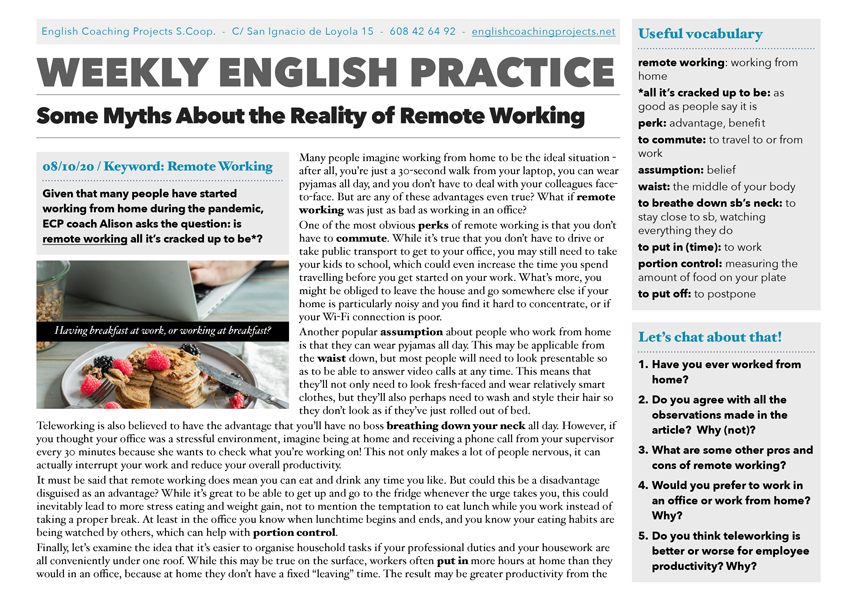Some Myths About the Reality of Remote Working
08/10/20 / Keyword: Remote Working
ECP coach Alison asks the question: is remote working all it’s cracked up to be*?
Click HERE to download the Weekly English Practice as a PDF.
Useful vocabulary
Read and check you understand this vocabulary before you read and listen to the text.
remote working: working from home
*all it’s cracked up to be: as good as people say it is
perk: advantage, benefit
to commute: to travel to or from work
assumption: belief
waist: the middle of your body
to breathe down sb’s neck: to stay close to sb, watching everything they do
to put in (time): to work
portion control: measuring the amount of food on your plate
to put off: to postpone
Listen to the audio and read the text (refresh the page if it’s not visible).
Given that many people have started working from home during the pandemic, ECP coach Alison asks the question: is remote working all it’s cracked up to be*?
Many people imagine working from home to be the ideal situation – after all, you’re just a 30-second walk from your laptop, you can wear pyjamas all day, and you don’t have to deal with your colleagues face-to-face. But are any of these advantages even true? What if remote working was just as bad as working in an office?
One of the most obvious perks of remote working is that you don’t have to commute. While it’s true that you don’t have to drive or take public transport to get to your office, you may still need to take your kids to school, which could even increase the time you spend travelling before you get started on your work. What’s more, you might be obliged to leave the house and go somewhere else if your home is particularly noisy and you find it hard to concentrate, or if your Wi-Fi connection is poor.
Another popular assumption about people who work from home is that they can wear pyjamas all day. This may be applicable from the waist down, but most people will need to look presentable so as to be able to answer video calls at any time. This means that they’ll not only need to look fresh-faced and wear relatively smart clothes, but they’ll also perhaps need to wash and style their hair so they don’t look as if they’ve just rolled out of bed.
Teleworking is also believed to have the advantage that you’ll have no boss breathing down your neck all day. However, if you thought your office was a stressful environment, imagine being at home and receiving a phone call from your supervisor every 30 minutes because she wants to check what you’re working on! This not only makes a lot of people nervous, it can actually interrupt your work and reduce your overall productivity.
It must be said that remote working does mean you can eat and drink any time you like. But could this be a disadvantage disguised as an advantage? While it’s great to be able to get up and go to the fridge whenever the urge takes you, this could inevitably lead to more stress eating and weight gain, not to mention the temptation to eat lunch while you work instead of taking a proper break. At least in the office you know when lunchtime begins and ends, and you know your eating habits are being watched by others, which can help with portion control.
Finally, let’s examine the idea that it’s easier to organise household tasks if your professional duties and your housework are all conveniently under one roof. While this may be true on the surface, workers often put in more hours at home than they would in an office, because at home they don’t have a fixed “leaving” time. The result may be greater productivity from the point of view of their employer, but having unclear boundaries between work and home means some of the household chores tend to get put off or ignored, and children might not get quality time with their parents.
All that being said, it seems that the bulk of these issues can be avoided with careful planning. By establishing clear working hours and meal times, we can ensure time is set aside each day for the remaining housework as well as time to relax. In addition, driving the kids to school can be seen as an opportunity to talk, sing or play word games, and you can always go to the supermarket or grab a coffee on the way home to make the most of your journey.
No doubt, everyone’s situation is unique and will require a unique approach, but perhaps, now that we’re aware of these potential issues and can take steps to prevent them, working from home can be just as blissful as we always imagined.
Written by ECP coach Alison Keable
Let’s chat about remote working!
- Have you ever worked from home?
- Do you agree with all the observations made in the article? Why (not)?
- What are some other pros and cons of remote working?
- Would you prefer to work in an office or work from home? Why?
- Do you think teleworking is better or worse for employee productivity? Why?
Click HERE for a very practical list of 50 English Work Idioms.
Take a moment to look at these related articles!
26/05/16 Forced to wear high heels at work?

